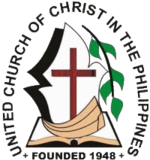
Back Nagkasararong Iglesya ni Cristo sa Filipinas BCL Church of the Redeemer CEB Gereja Serikat Kristus di Filipina ID Zjednoczony Kościół Chrystusowy na Filipinach Polish Igreja Unida de Cristo nas Filipinas Portuguese
| United Church of Christ in the Philippines | |
|---|---|
 | |
| Classification | Protestant |
| Orientation | United Mainline Methodist, Evangelical and Reformed |
| Polity | Mixed polity with Congregational, Presbyterian, and Connexional elements |
| General Secretary | Bishop Melzar D. Labuntog |
| Chairman | Jessie D. Garcia |
| Associations | |
| Region | Philippines |
| Headquarters | 877 EDSA West Triangle, Quezon City, Metro Manila 1104 |
| Origin | April 26, 1901 (officially May 25, 1948) Malate, Manila |
| Merger of |
|
| Congregations | 2,564 (estimate as of 2008) |
| Members | 1,500,000 |
| Tertiary institutions | 20 |
| Seminaries | 6 |
| Official website | uccpchurch |
The United Church of Christ in the Philippines (Tagalog: Ang Nagkaisang Iglesia ni Cristo sa Pilipinas; Ilokano: Nagkaykaysa nga Iglesia Ni Cristo iti Filipinas) is a mainline Protestant denomination in the Philippines. Established in its present form in Malate, Manila, it began as a uniting church after the merger of the Evangelical Church of the Philippines, the Philippine Methodist Church, the Disciples of Christ, the United Evangelical Church and several independent congregations.[1][2]
The UCCP has around 1,500,000 adherents, with 1,593 pastors in 2,564 congregations as of 2008.[3][4] As per the 2020 census, there are 470,792 members in the Philippines alone.[5][6] Its headquarters is located at 877 EDSA, West Triangle, Quezon City, Metro Manila.[7]
- ^ Norwood B. Tye, Journeying with the United Church of Christ in the Philippines: A History (Quezon City: United Church of Christ in the Philippines, 1994), 246-247
- ^ Guillermo Manuel, "A Study of the Movement for Union and Closer Cooperation Among the Protestant Churches of the Philippines," p. 54.
- ^ "Religion: Philippines Milestone". September 14, 1953. Archived from the original on December 9, 2006. Retrieved June 1, 2017 – via www.time.com.
- ^ "PC(USA) - Mission Connections - Letter". Archived from the original on September 11, 2009. Retrieved June 1, 2017.
- ^ "Religious Affiliation in the Philippines (2020 Census of Population and Housing)". Philippine Statistics Authority. January 22, 2023. Archived from the original on March 10, 2023. Retrieved October 28, 2024.
- ^ "TABLE A. Household Population by Religious Affiliation, Region, Province, and Highly Urbanized City: Philippines, 2020". Retrieved October 28, 2024.
- ^ World Council of Churches Archived December 1, 2008, at the Wayback Machine